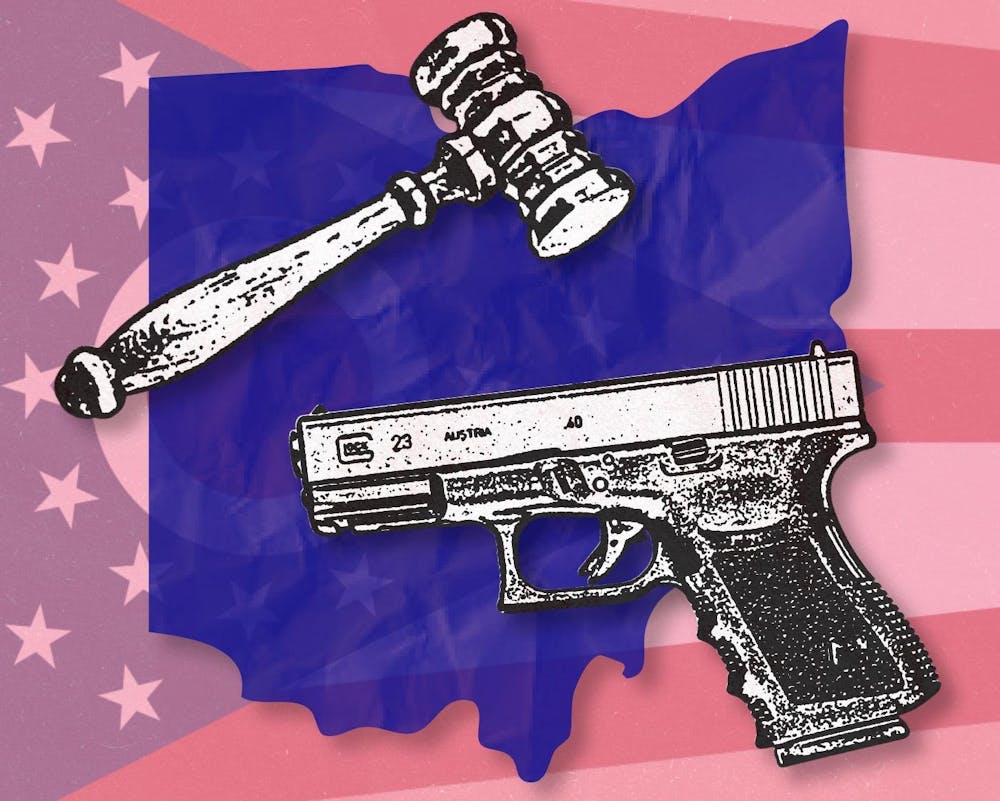This column, as well as four others, was written by a student in Matthew Arbuckle’s Federalism and Intergovernmental Relations (POL 364) class, based on the question of whether cities in Ohio should be able to enact gun laws in their own jurisdiction.
In the year 2023, there were 1,768 deaths caused by guns in Ohio.
The state has relaxed restrictions regarding gun usage and ownership. Some examples are how a person only has to be 18 to purchase a rifle or shotgun, only a background check is required when purchasing and there are no restrictions on the amount or type of ammunition that can be bought.
To reduce the number of gun fatalities, some Ohio cities – specifically Cincinnati, Cleveland and Columbus – have been trying to pass stricter regulations. They have been unsuccessful due to Ohio’s preemption laws, preventing cities from passing ordinances on firearms that are stricter than state laws. Ohio cities should not have the authority to enact their own gun laws, as it will not solve the overarching problem of high gun violence in urban areas.
The general public and the state are not supportive of the cities’ attempts to pass stricter gun laws. The current court case, Columbus v. Ohio, showcases this. When Columbus attempted to enact a law putting a cap on magazine purchases and requiring guns to be safely stored out of children’s reach, the lower trial courts stopped the application of this ordinance, claiming its restrictions were unconstitutional.
Not only is Ohio fighting stricter regulations, but it is actively passing legislation that supports looser gun laws. Showcasing this sentiment is the passage of Senate Bill 58, which prevents banks from tracking when people purchase firearms and prohibits gun owners from having to buy special insurance. With even looser gun regulations being passed, it is obvious that Ohio and its citizens enjoy their gun rights. If these rights were to be challenged in any way, the citizens would vehemently protest to their representatives. These lawmakers, who want to be reelected, will be persuaded not to support more restrictive legislation.
Overall, giving cities the right to create their own gun regulations will not reduce the amount of gun violence in urban areas. If people wish to own something illegal in the city, all they have to do is travel outside city limits, buy it and bring it back. For gun violence to be reduced, a statewide initiative that supports stricter gun regulations would have to be put in place. However, you risk running into the same problem.
Take Illinois as an example. According to Johns Hopkins Bloomberg School of Public Health, Illinois has some of the strictest gun laws in the country, and yet it still has the 10th highest overall gun homicide rate. This is because Illinois is bordered by states that have very relaxed regulations on guns. People travel to these states, buy what they need and then use it in Illinois. The same thing will happen in Ohio’s cities, especially considering people will have a significantly shorter travel distance to acquire what they want. Unless Ohio implements a statewide initiative, any other attempt at gun regulation is useless and provokes unnecessary public outrage.
It is important to note that, according to the National Library of Medicine, urban areas have the highest gun homicide death rates. If cities were given the authority to create their own ordinance, they could have the opportunity to bring these rates down. In addition, Article XVIII, Section 3 of the Ohio Constitution grants cities “all powers of local self-government.” These powers are called home rule, and they grant local governments – including cities – some autonomy when it comes to dealing with local matters.
According to the power of home rule and Ohio’s constitution, cities should be granted the ability to deal with their high gun homicide rates in the way they see fit. However, home rule does not apply to firearms because of Ohio’s preemption laws. Despite cities having higher death rates from guns, this doesn’t mean a new law will make the rates decrease. Once again, it can easily be evaded by people traveling outside city limits to purchase a firearm. Plus, a bunch of different gun laws will be confusing to citizens. It is best to have uniformity with important and controversial laws, so everyone is on the same page and understands expectations.
The political reality is that Ohio is a red state. Republicans have the majority in all major political offices, making it highly unlikely that statewide gun reform will be passed. In other words, it is highly unlikely that cities will be granted the right to bypass the preemption laws. People must recognize that uniformity in gun regulation is best to prevent confusion and outrage from the public.
If people understand what the law is, then they can make an informed decision to change it if they wish. Granting cities the right to change these gun laws on their own is counterproductive and, quite frankly, will not generate positive change.
Enjoy what you're reading?
Signup for our newsletter
Sidney Zawila is a sophomore double-majoring in political science and social justice. She is involved in Pi Sigma Epsilon and is the chief of staff of local relations for the Government Relations Network through the Office of ASPIRE.




